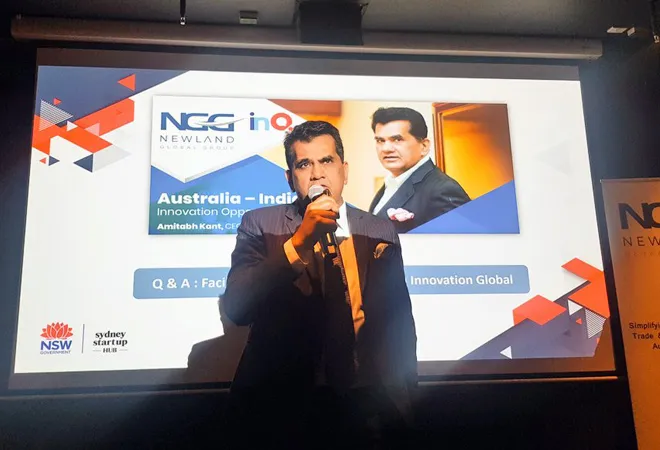
Governments today face the challenge of ensuring fiscal consolidation while fostering growth, competitiveness and employment. Hence, there is a strong demand for efficiency, better governance, faster delivery and more user involvement. But the question is what does it take to deliver and fulfill the rising aspirations? What does it take to address changing needs and improve quality and accessibility for all? The answer, in most cases, is innovation. Innovation becomes an imperative when problems are getting worse, when systems are not working or when institutions reflect past rather than present problems. As the great Victorian historian Lord Macauley wrote: ‘There is constant improvement precisely because there is constant discontent’.
Global demand for high-value, highly skilled and customized services and new technology is accelerating. Advances in technology – including the way we generate, process and use data – are creating new avenues for optimising productivity and understanding consumer demand and preferences. The future prosperity, health and sustainability of the world is closely bound to the human capacity for innovation.
Indian Startup Ecosystem
India has witnessed a remarkable growth in the startup ecosystem in last few years, especially with the launch of the government initiative of ‘Startup India’. Consumerism and digital revolution driven by the rise in number of smartphones and fuelled by an abundant supply of tech talent in the country, has encouraged this growth. There is also a palpable shift in the numbers of these start-ups from Tier 1 metro cities to Tier 2 cities, suggesting that innovation is now taking a pan – India vision. Startups like Byju’s and Embibe in the education sector, Mitra Biotech in the biotech sector, Social Cops in the social data sector, Ather Energy in the mobility sector, Tricog in the health sector, Culture Alley’s Hello English has taught 9 million Indians how to speak English, SatSure uses a combination of satellite and weather data and information to provide answers on crop volume, crop health, yield are all fine examples of such innovative startups.
The key strengths of the Indian startup ecosystem include the large diverse market size with growing demand for quality services, a growing young population embracing fast-tracked technology, largely English-speaking aspirational consumer market, the growth of the investment active middle-class and upper-middle-class segments, India's capability and continued support for "Frugal Innovation". Rising government funding at Centre and State level, policy support through government think tanks like NITI Aayog has also provided further impetus to the Indian startup ecosystem.
According to Invest India, the nodal organisation for start-ups in the country, India now has the second-largest startup ecosystem in the world with more than 20,000 start-ups in the country valued at US$75 billion. By 2024, India will see nearly 100,000 startups with a valuation of around US$500 billion. The Indian government is trying to foster startups by creating 500 new tinkering labs, 100 new incubation centers while assisting existing incubators. Invest India data shows that the country has 270 incubators, 2,200 angel investors, more than 200 venture capital firms, 22 unicorns (firms with a valuation of more than US$1 billion). In the last one and a half years, India has opened 2,400 Tinkering Labs in schools under the Atal Innovation Mission, with the objective to endorse STEM system of education, by cultivating curiosity, creativity, and imagination in young India.
Australian Startup Ecosystem
Australian startup ecosystem represents a strong innovation and digitally driven sector, very actively supported by the Government, Corporate and Academia/education institutions. Australian Universities are investing heavily in entrepreneurship and commercialisation. For example, University of Technology Sydney, Monash University and University of New South Wales now have deputy vice-chancellors of entrepreneurship. Over AU$85 million has poured into new university-affiliated startup programs and new buildings in the last five years. Half of Australia’s most active accelerators are university affiliated. If you’re a university and don’t have “startup strategy”, it isn’t attractive to students. The key strengths of the Australian startup sector are strong economy, corporate backing, founders with risk-taking attitude, culture and a strong focus on technology and innovation. Startups are the largest contributor to job creation in Australia. From 2004 to 2011, they created more than 1.2 million new jobs.
Innovation synergies between India and Australia
So, what really are the opportunities that exist for Australia and India to connect in the innovation sphere? Can Australia be partners with India, in its transformational journey driven by demand, technology and innovation?
These questions were also addressed by NITI Aayog CEO, Amitabh Kant recently, as he spoke at an event organized by Australia’s leading corporate advisory firm, Newland Global Group, that works towards strengthening India – Australia trade and investment ties in collaboration with InQ Innovation Global and Sydney Startup Hub. The Sydney Startup Hub (SSH) is the largest innovation centre of its kind in the Southern Hemisphere. Funded through a AU$35 million investment from the New South Wales Government, the SSH brings together Australia’s leading startups, incubators, accelerators and innovation programs under one roof that includes Asia’s largest Fintech hub including the likes of, Stone and Chalk, Tank Stream Labs for technology entrepreneurs and Fish burners to inspire and grow Australian tech start-ups.
He focused on the changes the Indian government has introduced to enable start-ups to grow, how the model of competitive cooperative federalism has created competition among States to develop ease of doing business, citing that startups must focus on India, as it has all the challenges of the world; therefore, needs all the innovations of the world. It is clear that innovations to address challenges like water scarcity, rising urbanisation, infrastructure needs, affordable health, quality education in India will inevitably also provide solutions to the world.
Also, India offers tremendous possibility because of its robust government-led infrastructural backend that can power global innovations. India is the only country in the world with a billion bank accounts, billion mobiles, billion biometric. There’s massive data-flow in the country with unique Aadhaar infrastructure, the India Stack, and the Unique Payment Interface, which is all government-led, unlike China, where Alibaba or Baidu, or Google and Facebook in the United States own private data.
India has gone digital, data rich and it has allowed its data to be used for innovation. Hence, Australia and India present a great opportunity to each other “to think and go global” early in their startup endeavours. Australian startup ecosystem can look at the Indian startup ecosystem to collaborate and support its sustained growth through development and manufacturing outsourcing, access to great and diverse customer market to validate ideas, access to funds and investors looking to invest in global startups through Joint Ventures and Indian market entry access/strategies, finding talent such as co-founders, engineers, managers, scientists and developing strategic partnerships with other multinational corporations that have a base in India. Indian Startup Ecosystem has a lot to leverage from some of the great ideas and innovation from Australian Startups and research from Australian Universities to help scale and make their solutions globally marketable and build valuation. In addition, there are opportunities to leverage the growing services, education, smart cities and healthcare sectors through their solutions.
Specific sectors such as AgriTech, Clean Energy Tech, EduTech, FinTech and Healthcare /Med-Tech, Bio-Tech, Social Enterprise Ventures, other technology areas include Block-Chain, Cyber Security, AI-ML, IOT, AR-VR-XR, Data Science and Digital Data-driven Services are emerging as globally strong Startup offerings. However, the key challenge for Australian innovators is the market size limitations, which have been inhibitors for global investors and VC funds. With the continued growth of social sector, infrastructure, services, agri & food safety, financial - inclusion services and telco sectors there is an enormous opportunity for Australian startup eco-system to leverage India as the "perfect global launch pad" and scale across the Indian market and potentially service broader Asian and African markets from there. India could also provide a landing pad, to help market-ready Australian startups and scale-ups take their business global.
The Indian startup ecosystem should look at the Australian startup ecosystem for global scalability opportunities for value – growth and commercialisation. The opportunity for early global collaboration, co-creation and acceleration programs would assist Indian startups to gain further global traction.
Analysis
There are many problems to solve; therefore there are many opportunities. Innovate, co-create, collaborate should be the mantra for India – Australia engagement in the innovation domain. Few suggestions to build an “innovation bridge” between both countries -
- Governments have shown the way; it is for businesses to support these start-ups in going forward with funding and investment support
- A need for an exclusive strategy focused on encouraging the right start-ups that address the current challenges and priorities, not simply more start-ups
- India and Australia can combine complementary skills and expertise to develop new innovations, by leveraging Australian expertise in areas such as agri-tech, health-tech, water management, energy efficiency and renewables, with Indian expertise including in data analytics, biotech, and mobile applications
- Australia can combine research and technology with India's record of frugal innovation to scale up innovations or create new products
- Entrepreneurs lack the skills to ‘scale up,’ a strong exchange of mentorship can help in addressing this gap. Collaborating, sharing ideas and networking is what helps founders get the right feedback, focus and grow in a more efficient manner
- Dependence on anecdotal feedback should be replaced with data and evidence-based information to make a judgment on potential market opportunities or challenges
- Entrepreneurial mindset needs to be supported with enabling network of actors (that includes government, businesses and academia/educational institutions)
Both India and Australia can work together and be partners in development to create solutions for the world. Communication, collaboration and consistency will take it forward.
The views expressed above belong to the author(s). ORF research and analyses now available on Telegram! Click here to access our curated content — blogs, longforms and interviews.




 PREV
PREV


